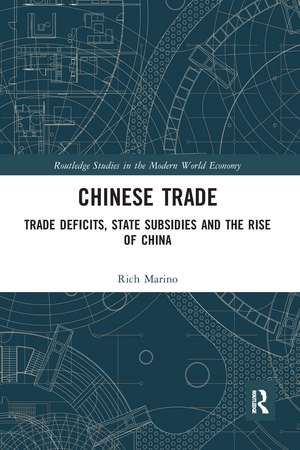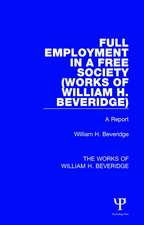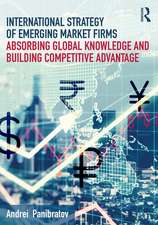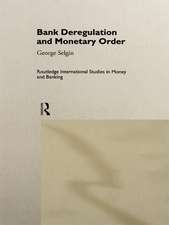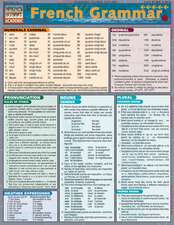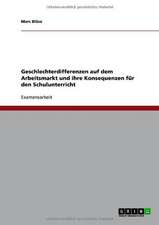Chinese Trade: Trade Deficits, State Subsidies and the Rise of China: Routledge Studies in the Modern World Economy
Autor Rich Marinoen Limba Engleză Paperback – 30 iun 2020
This book shows that government subsidies play a big part in China’s success. Government subsidies include those to basic industries: energy (coal, electricity, natural gas and heavy oil), steel, glass, paper, auto parts, solar and more. A lot has been written about China’s trade practices with the West, but none of this work addresses the real unsustainable dilemma. Much of the current literature discusses the problems but doesn’t explain the root cause of China’s lopsided trade practices with the West or explain in detail how China finances its government subsidies, with nothing written that explains that China’s subsidized exports to the United States and European Union are basically self-funded by its enormous trade surplus with the West. A trade surplus represents a net inflow of domestic currency from foreign markets and is the opposite of a trade deficit, which would represent a net outflow. Moreover, this is the only book that describes China’s current trade practices with the West as a zero sum game at the expense of the West.
This book provides two solutions to this endless quagmire: an increase in Western exports to China so that China and the West have more of an equal trade balance, or a very steep reduction of China’s exports to the West.
| Toate formatele și edițiile | Preț | Express |
|---|---|---|
| Paperback (1) | 257.25 lei 6-8 săpt. | |
| Taylor & Francis – 30 iun 2020 | 257.25 lei 6-8 săpt. | |
| Hardback (1) | 764.62 lei 6-8 săpt. | |
| Taylor & Francis – 15 aug 2018 | 764.62 lei 6-8 săpt. |
Din seria Routledge Studies in the Modern World Economy
-
 Preț: 310.84 lei
Preț: 310.84 lei - 8%
 Preț: 389.46 lei
Preț: 389.46 lei -
 Preț: 384.87 lei
Preț: 384.87 lei -
 Preț: 324.35 lei
Preț: 324.35 lei -
 Preț: 310.33 lei
Preț: 310.33 lei -
 Preț: 385.80 lei
Preț: 385.80 lei -
 Preț: 326.15 lei
Preț: 326.15 lei -
 Preț: 306.19 lei
Preț: 306.19 lei - 18%
 Preț: 1112.34 lei
Preț: 1112.34 lei - 28%
 Preț: 992.21 lei
Preț: 992.21 lei - 15%
 Preț: 714.29 lei
Preț: 714.29 lei - 18%
 Preț: 1054.27 lei
Preț: 1054.27 lei - 28%
 Preț: 821.46 lei
Preț: 821.46 lei - 18%
 Preț: 1167.78 lei
Preț: 1167.78 lei - 15%
 Preț: 699.01 lei
Preț: 699.01 lei - 18%
 Preț: 946.06 lei
Preț: 946.06 lei - 18%
 Preț: 1230.51 lei
Preț: 1230.51 lei -
 Preț: 398.18 lei
Preț: 398.18 lei - 18%
 Preț: 1167.61 lei
Preț: 1167.61 lei - 30%
 Preț: 1014.31 lei
Preț: 1014.31 lei - 28%
 Preț: 823.99 lei
Preț: 823.99 lei - 28%
 Preț: 820.73 lei
Preț: 820.73 lei - 18%
 Preț: 1166.68 lei
Preț: 1166.68 lei - 26%
 Preț: 849.65 lei
Preț: 849.65 lei - 18%
 Preț: 1278.70 lei
Preț: 1278.70 lei - 18%
 Preț: 1059.84 lei
Preț: 1059.84 lei - 15%
 Preț: 699.01 lei
Preț: 699.01 lei - 27%
 Preț: 1022.76 lei
Preț: 1022.76 lei - 27%
 Preț: 564.95 lei
Preț: 564.95 lei - 18%
 Preț: 720.49 lei
Preț: 720.49 lei - 18%
 Preț: 1061.93 lei
Preț: 1061.93 lei - 15%
 Preț: 643.71 lei
Preț: 643.71 lei - 18%
 Preț: 711.10 lei
Preț: 711.10 lei - 18%
 Preț: 905.11 lei
Preț: 905.11 lei - 18%
 Preț: 1109.21 lei
Preț: 1109.21 lei - 18%
 Preț: 1171.89 lei
Preț: 1171.89 lei - 18%
 Preț: 1064.67 lei
Preț: 1064.67 lei - 18%
 Preț: 1167.43 lei
Preț: 1167.43 lei - 18%
 Preț: 1057.05 lei
Preț: 1057.05 lei -
 Preț: 423.30 lei
Preț: 423.30 lei - 18%
 Preț: 1063.28 lei
Preț: 1063.28 lei - 18%
 Preț: 1164.75 lei
Preț: 1164.75 lei - 18%
 Preț: 1123.68 lei
Preț: 1123.68 lei - 15%
 Preț: 694.09 lei
Preț: 694.09 lei -
 Preț: 398.44 lei
Preț: 398.44 lei - 18%
 Preț: 1219.38 lei
Preț: 1219.38 lei - 28%
 Preț: 873.52 lei
Preț: 873.52 lei - 18%
 Preț: 1062.93 lei
Preț: 1062.93 lei - 29%
 Preț: 1030.16 lei
Preț: 1030.16 lei - 31%
 Preț: 765.84 lei
Preț: 765.84 lei
Preț: 257.25 lei
Preț vechi: 325.06 lei
-21% Nou
Puncte Express: 386
Preț estimativ în valută:
49.23€ • 53.46$ • 41.35£
49.23€ • 53.46$ • 41.35£
Carte tipărită la comandă
Livrare economică 22 aprilie-06 mai
Preluare comenzi: 021 569.72.76
Specificații
ISBN-13: 9780367587833
ISBN-10: 0367587831
Pagini: 212
Dimensiuni: 156 x 234 mm
Greutate: 0.32 kg
Ediția:1
Editura: Taylor & Francis
Colecția Routledge
Seria Routledge Studies in the Modern World Economy
Locul publicării:Oxford, United Kingdom
ISBN-10: 0367587831
Pagini: 212
Dimensiuni: 156 x 234 mm
Greutate: 0.32 kg
Ediția:1
Editura: Taylor & Francis
Colecția Routledge
Seria Routledge Studies in the Modern World Economy
Locul publicării:Oxford, United Kingdom
Public țintă
Postgraduate, Professional, and UndergraduateCuprins
Part I United States, the European Union and China 1. Introduction 2. Nixon and Kissinger Part II Spectacular Growth and the Chinese Economy 3. China Reforms in 1978 to 1990 4. China from 1990 Forward 5. China’s Currency Manipulation Part III Foreign Direct Investment 6. US Foreign Direct Investment 7. European Foreign Direct Investment 8. China Foreign Direct Investment in the United States 9. China Foreign Direct Investment in Europe Part IV Trade Balances 10. US Trade Policies and Trade Balances with China in the 1990s 11. EU Trade Policies and Trade Balances with China in the 1990s 12. US Trade Policies and Trade Balances with China from 2000 13. EU Trade Policies and Trade Balances with China from 2000 Part V Conclusions 14. Conclusions
Notă biografică
Rich Marino is the former Senior Vice-President of Morgan Stanley, USA. After leaving Morgan Stanely, he completed an MSc (Research) in Economic History at the London School of Economics, UK, and he became an established economics author, publishing Submerging Markets (2013) and The Future BRICS (2015).
Descriere
Chinese Trade demonstrates how government subsidies play a large part in China’s economic growth success. Moreover, it describes China’s current trade practices with the West as a zero sum game at the expense of the West, and explores two solutions: an increase in Western exports to China or a very steep reduction of China’s exports to
